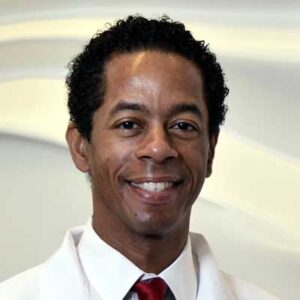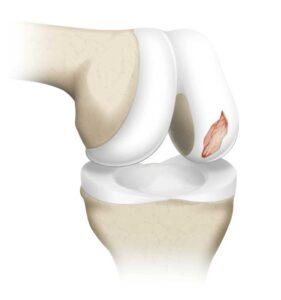Knee Chondral Injury Specialist

Are you experiencing pain with weight bearing? Do you have a locking sensation in your knee with swelling or decreased range of motion? If so, you may have a chondral injury, lesion or defect, which is a condition that affects the articular cartilage of the knee. Knee chondral injury specialist, Doctor Riley J. Williams provides diagnosis and both surgical and nonsurgical treatment options for patients in Manhattan, Brooklyn, New York City and surrounding areas who are experiencing symptoms associated with knee chondral injuries, defects or lesions. Contact Dr. Williams’ team today!
What is a chondral injury in the knee?
A chondral injury is characterized by damage to the articular cartilage. These types of lesions are common in the knee. Articular cartilage is the smooth, durable tissue that covers the ends of the bones in a joint. The presence of articular cartilage in normal joints makes it possible for the bones to move against each other painlessly and smoothly. Chondral injuries can occur from normal wear-and-tear; in this scenario articular cartilage often breaks down as part of the aging process (osteoarthritis). Chondral injuries can also occur from traumatic falls, pivoting injuries, sports collisions, kneecap dislocations, and in association with ligament tears (i.e. ACL tears) .
What is a chondral lesion?
A chondral lesion in the knee is a collective term for an injury, or pathology that causes a breakdown or shearing of the articular cartilage in the knee. Chondral lesions can be the result of an acute injury, when there is a sudden overload on the knee joint, or from metabolic changes. The cartilage can be crushed, torn or damaged. In rare cases, a cyst can form in the bone below the damaged cartilage or chondral lesion.
What is a chondral defect?
A chondral defect refers to a focal area of damage to the articular cartilage. Chondral defects can occur from an underlying disorder, from acute trauma, or from daily wear and tear. Chondral defects can sometimes also affect the underlying bone, or such lesions can occur in isolation without bone involvement. Cartilage has a poor ability to repair itself, as it has a very limited blood supply. Without treatment, chondral defects do not heal, and often get bigger over time. In situations where the cartilage is separated from the bone, the affected area must be repaired or replaced. Dr. Williams has several different treatments available to repair or replace the damaged cartilage tissue. He can discuss the options available for the individual patient and their chondral defect.
For more information on chondral lesion, injury, or defect or other articular cartilage injuries, as well as the many different treatment options available for your knee injury, please contact the office of Riley Williams, MD, knee specialist serving Manhattan, Brooklyn, New York City, NY and surrounding areas.
Locations
610 W 58th Street
New York, NY 10019
148 39th Street, 7th Floor
Brooklyn, NY 11232




